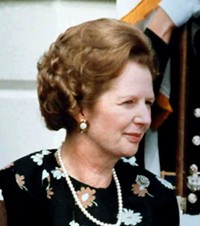The 80s

The popular view of the 80s is the decade of greed, its symbol being the City trader driving a Porsche, doing business on a brick sized mobile and consulting a Filofax. The 80s was also time of rising prosperity and rising house prices for many, not just for few. However, that prosperity was not shared by all and the 80s was also a decade of deep social divisions and the North-South divide.
Politically the Conservative Party dominated in the 80s. Britain's first woman Prime Minister, Margaret Thatcher was elected in 1979, following a series of public sector strikes dubbed the Winter of Discontent. She promised to bring a new economic order.
Britain suffered a severe recession in the early 80s. Many businesses failed and unemployment reached record levels. Mrs Thatcher's strict monetarist doctrines initially made the problems worse and violent riots broke out in Toxteth in Liverpool, Brixton in London and Moss Side in Manchester. It seemed that the country was falling apart. The Specials record 'Ghost Town' (1981), about the economic ills facing Coventry, summed up the mood of the nation.
In 1982, Argentina tried to take advantage of Britain's perceived weakness and invaded the Falkland Islands. Mrs Thatcher demonstrated her strong leadership and organised a task force to recapture the Islands. This victory, combined with more favourable economic conditions, restored her popularity.
Mrs Thatcher's policies shaped the character of the Britain throughout the 80s. She favoured private enterprise over state control. Britain prospered in the 80s with rising living standards for many. At the time, it was seen as an economic miracle. Those in the London and the South East did best and those in the financial sector best of all. The word Yuppie entered the language meaning young, upwardly mobile professional. Some of the Yuppies in the City of London boasted of bonuses as big as telephone numbers.
The 80s was an era of trends running in different directions. The Prime Minister talked about Victorian values and moral behaviour. Norman Tebbit, the Employment Minister who told workers to get on their bikes, derided the permissive society. Yet the 80s was, in reality, far more permissive than the sixties in attitudes to sex before marriage and gay relationships. In the end only AIDS (Acquired Immune Deficiency Syndrome) acted as some limit to sexual freedom.

Technology in the shape of home computers, video recorders and microwave ovens made many peoples' lives better. It also revolutionised the world of business in the 80s. The 'Big Bang', deregulation of the City of London, was only possible with technological advances. The world saw huge advances in communications and the first UK mobile phone call was made by Ernie Wise in 1985. The mobile phone became the symbol of the decade. Few people could afford one, and that was part of the attraction.
Yet the 80s looked to the past for its inspiration. Victoriana was popular and auction prices for Victorian art were high. New shopping centres rejected the modern and attempted to capture the charm of a previous age. By the end of the decade home interiors evoked more of the past than the present with country cottage kitchens, dado rails and Victorian print wallpapers.
There was a house price boom in the eighties and people felt wealthier. Speculators got rich by holding property. Council tenants bought into the new property owning democracy when the Government offered to sell them their own homes at a substantial discount. Government privatisations of British Telecom and British Gas also made more people share owners.
Rising living standards were not shared by all. Those employed in traditional industries, coal, shipbuilding, steel and motor car manufacture faired less well. There was a genuine North-South divide and the gap between the richest and the poorest widened.
In the world of fashion, Japanese designers were setting the pace in the early years of the 80s. There was a trend towards looser fitting, layered clothing. Later in the 80s, power dressing and big shoulder pads influenced by the glamorous American soap, 'Dynasty' took over. Fashion was more exclusive; it was all about designer labels. On the high street the innovative retailer, Next, set the pace. Next targeted the 25 to 45 age group with the emphasis on fashionable, designer-inspired clothing. Marks and Spencer also upgraded its image for the 80s.
There was a fashion for wax cotton jackets, particularly made by Barbour. They suggested you had a job in town, but a vast estate in the country (probably you just had a job in town). It was OK to be rich and let people know you were; the 80s was the era of the Sloane Ranger.
Musically the 80s was an innovative decade, taking the aftermath of punk through to the new romantics. Duran Duran captured the spirit of the decade, and were most identified with the new prosperity. The 80s ended with the mass produced pop of Stock, Aitkin and Waterman.
In the final years of the decade the scourge of inflation returned and higher interest rates put peoples' homes at risk. As the decade ended the new prosperity was unravelling. Mrs Thatcher, now unpopular with the public for policies such as the poll tax, continued in power to the end of the decade, but was ousted as Tory leader in 1990. The prosperity of the 80s did not last into the new decade.
Read more:
By Steven Braggs

